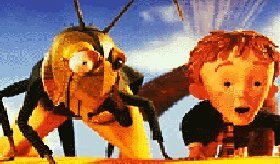|
|
| Tookey's Review |
|
| Pro Reviews |
|
| Mixed Reviews |
|
| Anti Reviews |
|
| Cast |
|
| |
 |
| |
| Released: |
1996 |
| |
|
| Genre: |
FANTASY
ANIMATION & LIVE ACTION
FAMILY
|
| |
|
| Origin: |
US |
| |
|
| Length: |
80 |
|
| |
|
| |
|
|
| |
|
|
James Henry Trotter (Paul Terry) is an English boy who leads a blissful existence at the seaside until his parents make the mistake of travelling to London, where they are gobbled up by an enormous, angry rhinoceros.
|
Reviewed by Chris Tookey
|
James is understandably upset, even more so when sent to work all the hours of the day for sadistic maiden aunts, Spiker (Joanna Lumley) and Sponge (Miriam Margolyes) uglier, older and nastier than Cinderella's sisters. A mysterious old man (Pete Postlethwaite) takes pity on James and offers a way out with a bag full of magical 'crocodiles' tongues'. James, who it seems has never been told not to take sweets, drugs or tongues from strangers, accepts with alacrity. When James accidentally drops the bag under a peach tree, the tongues wag and bear strange fruit: a giant peach, which the aunts promptly exploit as a tourist attraction. He crawls inside it, recognizes its touring potential, and embarks upon an airborne, transatlantic journey which is an amazing cross between Lewis Carroll and Jules Verne.
Not so much a peach as a curate's egg. Dahl's 1961 children's classic is a marvellous but not easily filmable book, and the filmmakers have turned it into a far more straighforward, coherent adventure story.
They have sensibly given James a fondness for bugs which he carries into his adventures, and they have established a clearer purpose to his travels. He has an ambition to visit New York City. Unfortunately, the film-makers' misty-eyed vision of Manhattan as a place of infinite promise, a real-life Emerald City where everyone can follow his dream and make loads of dosh, smacks more of Disney than Dahl. The film's "can-do", "pro-positive thinking" message threatens to turn the whole thing into a weirdly allegorical version of The Richard Branson Story.
The script seems to have been put together by humourless child psychologists, not screenwriters with a flair for fantasy. Dahl uses the device of a homicidal rhino as a jokily surreal, and typically callous, narrative device, purely in order to turn James into an orphan. This isn't enough for the film-makers, who have to make the beast a metaphorical representation of young James's darkest fears. But if so, how come James's darkest fears killed his parents?
Admittedly, not much of Dahl's original plot makes sense. But by making the book less dreamlike, the film-makers raise practical questions - such as who made the monstrous mechanical shark whch attacks the peach? - which never get answered.
The most serious error of taste lies in the use of live action to top and tail the film. The sets are phoney, the performances straight from a panto matinee. The two ugly sisters are more camp than funny, fail to warrant the screen time they are given, and make the film's change into animation both jarring and belated.
It's only when James becomes an animated character that the film takes off. When the peach lands in New York and turns back into live action, the film too comes back to earth with a horrible bump - not least with the re-entry of James's aunts, whom Dahl sensibly squashed early on.
Adults may prefer this film to children, for small ones may find it scary, confusing and creepy. Lacklustre, sub-Broadway songs by Randy Newman stop the show in the wrong sense.
It doesn't create the sense of wonder that Ray Harryhausen's more technically primitive efforts did in The Seventh Voyage of Sinbad, nearly forty years ago. It hasn't the wit and warmth of Nick Park's tales of Wallace and Gromit, nor the dark, anarchic streak of Wladyslaw Starewicz's 1932 masterpiece, Tale of the Fox - which is a good deal closer in spirit to Roald Dahl.
Yet, for all its faults, James and the Giant Peach offers much to enoy. It is an impressive feat of stop-animation, well worth seeing for some funny lines and genuinely magical moments. Parts resemble a surreal Around the World in Eighty Days, with James's giant peach being lifted aloft by a hundred seagulls. Roald Dahl's original has been augmented less magically by a new undersea section reminiscent of director Henry Selick's previous film, The Nightmare Before Christmas.
The friendly bugs whom James meets inside the giant peach are reminiscent of Alice in Wonderland - or rather, more's the pity, Disney's film of Alice. There's a centipede who - for some, unexplained reason - speaks fluent, cab-driver Brooklynese (Richard Dreyfuss) and a long-legged spider who seems to have crawled over from Paris (silkily voiced by Susan Sarandon). But the voice-over honours are stolen by the English contingent: Simon Callow as a fruity grasshopper, Jane Leeves as a homely Ladybird (renamed a Ladybug as another concession to American audiences) , and - best of all - David Thewlis as a doleful, defeatist earthworm.
|
|
|
